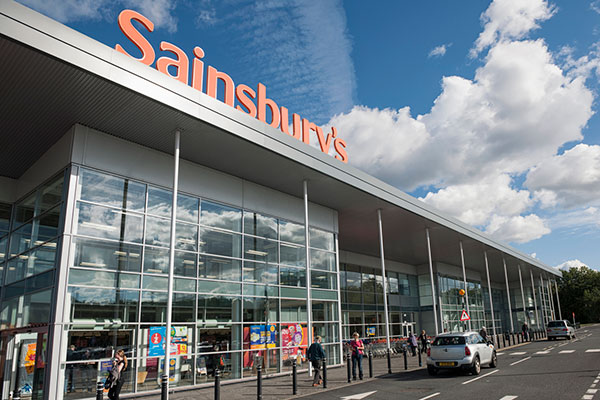ii view: Argos a drag on Sainsbury's despite grocery growth
Shares in this iconic supermarket operator have comfortably underperformed major rival Tesco in 2024. We assess prospects.
7th November 2024 11:16
by Keith Bowman from interactive investor

First-half results to 14 September
- Revenue up 2.3% to £17.2 billion
- Like-for-like sales excluding fuel sales up 3.4%
- Adjusted retail operating profit up 3.7% to £503 million
- Interim dividend unchanged at 3.9p per share
Guidance:
- Continues to expect adjusted retail profit for the year ahead of between £1.01 billion and £1.06 billion, or year-over-year growth of between 5% and 10%
Chief executive Simon Roberts said
"Our food business is going from strength to strength and we're making the biggest market share gains in the industry, with continued strong volume growth. More and more customers are coming to us for their big food shop, recognising our winning combination of value, quality and service.
“Argos trading has improved through the second quarter and in more recent weeks, so we continue to expect to deliver strong retail underlying operating profit growth and free cash flow generation for the full year.”
- Invest with ii: What is a Managed ISA? | Open a Managed ISA | Transfer an ISA
ii round-up:
Supermarket operator Sainsbury (J) (LSE:SBRY) today detailed a familiar situation, with growth in grocery sales countered by falling demand at Argos.
A 5% gain in food sales compared to a same size fall at Argos in the six months to mid-September. That meant second-quarter like-for-like sales rose 3.4% versus a 2.7% increase in the first quarter. Overall group revenue climbed 2.3% to £17.2 billion, driving a 3.7% improvement in adjusted retail operating profit year-over-year to £503 million – marginally shy of City forecasts.
Shares in the FTSE 100 company fell 2% in UK trading having come into this latest update down by close to 12% year-to-date. That’s better than a halving at Ocado Group (LSE:OCDO) but in contrast to a 23% gain for Tesco (LSE:TSCO) shares. The FTSE 100 index is up 6% in 2024.
Sainsbury's runs around 595 supermarkets, 830 convenience stores and 660 Argos stores, most of which are now located within a Sainsbury's outlet.
Accompanying management guidance pointed to continuing expectation for full-year adjusted retail profit to come in at between £1.01 billion and £1.06 billion, representing year-over-year growth of 5-10%.
An interim dividend of 3.9p per share is unchanged from that paid in 2023, with a £200 million share buyback programme on track to complete in the second half.
A third-quarter trading update is scheduled for the 10 January.
ii view:
Founded in 1869, the retailer today employs around 148,000 people. It acquired Argos in 2016 with other group brands including Habitat, Tu and Nectar. Most of its bank operations are in the process of being sold to NatWest Group (LSE:NWG). Initiatives under management’s relatively new ‘Next Level’ strategic push to March 2027 include growing food volumes ahead of the market, cutting costs by £1 billion, and generating profit leverage from sales growth.
For investors, falling general merchandise sales, hindered by pressured consumer spending because of high borrowing costs, continue to take their toll. Sainsbury’s push to differentiate itself from rivals remains ongoing, with intense price competition from discounters Aldi and Lidl, and competition for its own premium ranges from Waitrose and Marks & Spencer Group (LSE:MKS). Costs, and particularly wages, are now elevated.
- Where to invest a year-end stash of cash
- ii view: juggernaut Tesco - still the one to beat
- Stockwatch: a tax warning for UK and US investors
To the upside, grocery price increases below rivals are helping drive increased food volumes. Cost savings of £1 billion are being pursued. The previously announced sale of its core banking operations leaves management more focused on the performance of retail, while a price to net asset value of under one compares to values of over five times at Amazon, Dunelm and Greggs, suggesting the shares are not obviously expensive.
For now, and despite continued risks, investors will likely note Sainsbury's now trades at a discount to Tesco's valuation, while a 5% dividend yield exceeds that of its larger rival. A consensus analyst fair value estimate above 300p might also keep fans of this supermarket giant optimistic about the long term.
Positives:
- Management improvement programme
- Attractive dividend payment (not guaranteed)
Negatives:
- Exposure to pressured consumer spending
- Intense sector competition
The average rating of stock market analysts:
Buy
These articles are provided for information purposes only. Occasionally, an opinion about whether to buy or sell a specific investment may be provided by third parties. The content is not intended to be a personal recommendation to buy or sell any financial instrument or product, or to adopt any investment strategy as it is not provided based on an assessment of your investing knowledge and experience, your financial situation or your investment objectives. The value of your investments, and the income derived from them, may go down as well as up. You may not get back all the money that you invest. The investments referred to in this article may not be suitable for all investors, and if in doubt, an investor should seek advice from a qualified investment adviser.
Full performance can be found on the company or index summary page on the interactive investor website. Simply click on the company's or index name highlighted in the article.